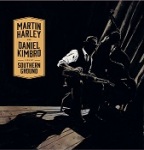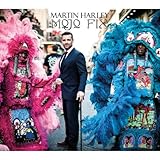 I don’t know if it’s a coincidence or if this is going on all the time, but this is the second album we’ve reviewed in two weeks that was recorded live at Southern Ground in Nashville. Martin Harley, roots acoustic and slide maestro has teamed up with upright bass player Daniel Kimbro to revisit some of his own back catalogue and rework a few classics as well. Just to add a little pressure to the situation, they decided to record the whole album in a day. Now there are a couple of ways you can look at a project like this. You could see it as an easy way of knocking out an album without having to write any new material, but it’s obvious from the opening sitar-like slide and menacing bowed double bass of “Cardboard King” (from the “Mojo Fix” album) that this is the real thing; it’s two craftsmen giving a masterclass in acoustic blues arrangement and playing, and it sounds like they just happen to be having a lot of fun while at the same time. “Live at Southern Ground” also serves as a great example of the variety and dynamic range you can produce from two players and two voices, especially when they’re as good as this.
I don’t know if it’s a coincidence or if this is going on all the time, but this is the second album we’ve reviewed in two weeks that was recorded live at Southern Ground in Nashville. Martin Harley, roots acoustic and slide maestro has teamed up with upright bass player Daniel Kimbro to revisit some of his own back catalogue and rework a few classics as well. Just to add a little pressure to the situation, they decided to record the whole album in a day. Now there are a couple of ways you can look at a project like this. You could see it as an easy way of knocking out an album without having to write any new material, but it’s obvious from the opening sitar-like slide and menacing bowed double bass of “Cardboard King” (from the “Mojo Fix” album) that this is the real thing; it’s two craftsmen giving a masterclass in acoustic blues arrangement and playing, and it sounds like they just happen to be having a lot of fun while at the same time. “Live at Southern Ground” also serves as a great example of the variety and dynamic range you can produce from two players and two voices, especially when they’re as good as this.
The non-originals on the album demonstrate Martin and Daniel’s interpretative abilities; “Goodnight Irene” is slowed down to an almost funereal pace with plenty of room for slide fills and raw emotional vocals while Tom Waits’ “Chocolate Jesus” is taken at an almost frantic pace and features a solo which build and builds to the point where you wonder how many Weissenborns Martin’s actually playing. Blind Willy Johnson’s “Nobody’s Fault but Mine” sticks much more closely to the original (well, a lot closer than the Zeppelin version). Of the songs from Martin’s excellent “Drumrolls for Somersaults” album, the lovely “Winter Coat” is taken at a slower pace and works well in a stripped-down version with perfect harmonies from Daniel, while “Honey Bee” becomes a fast country blues as a contrast to the original rockabilly version, and “Love in the Afternoon” has a greater emphasis on the Django Rheinhardt stylings than the original.
And then, when you think it’s all over (spoiler alert), check your time display (or just look at your vinyl) because there’s a hidden track. It’s a new take on “Blues at my Window” from the 2008 “Grow Your Own” album with Martin displaying his slide virtuosity while Daniel’s bowed bass moves from the growling, menacing bottom end up into the cello range to supply counter melodies. If you want a reason for making the album, this is it; there’s a song framework in place, but it’s all about the two players finding space to make their own creative contributions, and they do it to perfection.
“Live at Southern Ground” has all the intimacy of a live performance in a small venue. It’s a bit like looking through a crack in the door to see what musicians do when they think no-one’s watching or listening. Luckily, this time they decided to share it with the rest of us.
“Live at Southern Ground” is out on September 25th on Del Mundo Records (CD, Vinyl and download).
 More often than not, it’s pretty easy to decide the message of a review. You like the album or you don’t; it’s original or it’s derivative; it’s played well or it’s played badly. It can get a bit more complicated when the album provokes both positive and negative reactions; for me, this is one of those albums.
More often than not, it’s pretty easy to decide the message of a review. You like the album or you don’t; it’s original or it’s derivative; it’s played well or it’s played badly. It can get a bit more complicated when the album provokes both positive and negative reactions; for me, this is one of those albums.
Throughout Martin Harley’s “Mojo Fix” the playing is exemplary, from the distorted slide and raucous riffing of the title track (with a nod to “Seven Nation Army” in the chorus) through the gentle finger-picking and delicate strings of “Cardboard King” to the electric reggae treatment of “Rum Shack”. The quality of the songwriting is consistently good throughout the album and, generally speaking, the arrangements work well for the songs. I love “Cardboard King”, “Treading Water” and “Tightrope” and I could get really enthusiastic about virtually every song on this album if I could accept the necessity for filtering out all of the lower frequencies from the lead vocal on over half of the tracks on the album. It’s a technique (or gimmick, you choose) which works when it’s used sparingly, but becomes incredibly grating when it’s over-used. “Wrecking Ball” is a perfect example; it’s an uptempo swing song with horn and violin arrangements which evoke a particular era in the development of pop and rock music between big band jazz and rock ‘n’ roll, but it doesn’t need a megaphone-style vocal to hammer home that message.
If you listen to Martin Harley’s previous work, it’s obvious that he has a powerful, resonant voice which works well against a background of electric or acoustic guitar and it seems like a strange production decision to strip out all of that character for the majority of this album. Musical taste is always subjective and I’m quite prepared to be shot down in flames, but I’d prefer to hear his voice with all of the frequencies coming through rather than a vocal which sounds like it was recorded in the 1930s.
The quality of the songs, playing and arrangements on the album would earn it a 4/5 rating but, for me, the production is 2/5 at best (feel free to disagree) and, overall, it averages out somewhere in the middle. On a much more positive note, the contradictions of this album forced me to go back to Martin Harley’s earlier work and I have to say that I loved “Drumrolls for Somersaults”. I’m also interested to hear how this material is arranged in a live setting, so I’m still looking forward to the 100 Club gig next month.


